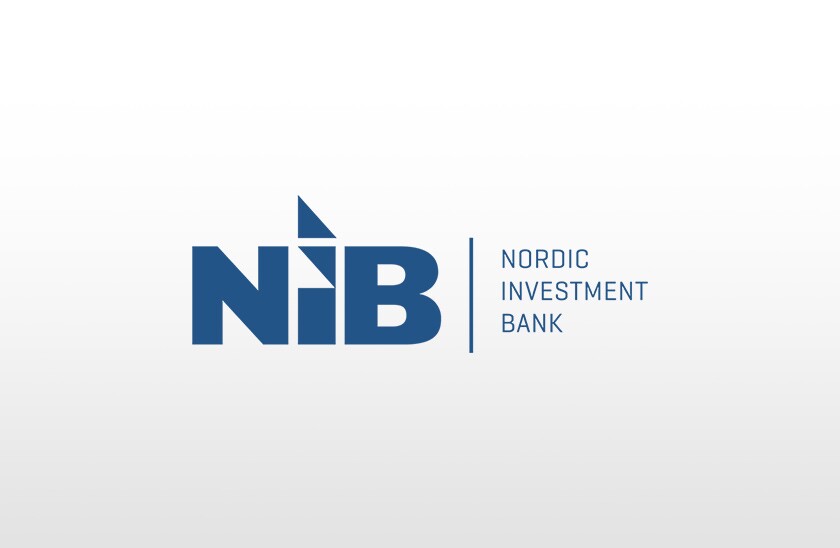What has NIB recently been up to?
“Our net interest income hit a historic high. The record is not only attributable to high interest rates and the economic climate, but also to a number of strategic decisions we have taken.
NIB is focused on financing climate and nature, productivity, and innovation, as well as looking at ways to support regional resilience. Our Board of Directors recently approved NIB’s updated Sustainability Policy for public consultation, opening for financing defence while excluding weapons and ammunition.
Importantly, we remain dedicated to financing the transformation towards a climate and nature resilient economy. NIB has put in place a Climate Strategy with interim decarbonisation targets for 2030 to better support our member countries in their transition. Our own long-term target is to become a net-zero bank by 2050.
Maximising our added value by providing sustainable long-term financing in the Nordic-Baltic region is at the heart of it all.”
How can NIB maximise its impact as an IFI?
“Achieving a climate and nature-resilient economy requires substantial additional investments and NIB is committed to bridge this financing gap by mobilising resources and attracting private investment.

We are financing Nordic and Baltic companies in transformative industries, including renewable energy, battery value chains, the hydrogen economy, carbon capture and storage, carbon-neutral steel production and electrification of transport.
As a bank striving for net-zero, completely divesting from hard-to-abate companies might make our portfolio look good, but it wouldn’t help the planet.
This is why NIB focuses on financing both ‘fast-lane’ sectors with green solutions and ‘slow-lane’ sectors that face challenges in reducing carbon emissions, provided the companies commit to and follow a 1.5°C pathway.
Beyond the environmental impact, NIB plays a crucial role in supporting member countries by financing investments that enhance productivity improvements and economic resilience.”
What are the most important types of projects that NIB finances?
“NIB prioritises high-impact projects where we can add value in the financing structure through our long-term lending.
We focus on the entire value chain — e.g. from energy production to battery cells, to car and truck manufacturers using these cells, and to customers electrifying their fleets. This approach supports not only individual projects but the broader transition of entire industries.
NIB has also started extending tailor-made sustainability-linked loans (SLLs) to companies. We have had very good dialogue with leading Nordic and Baltic corporates about their transition strategies.
Looking at these SLLs on our books, we are now discussing with investors how to possibly use them in our funding mix.”
How is NIB’s funding strategy outlook ahead of the mid-year?
“We will continue to serve the evolving needs of our investors.
Key elements to our funding this year include US dollar global benchmark transactions, along with diverse public and private issues, ensuring a varied currency portfolio and broad investor base.
We have also raised money in currencies such as Australian Dollars and New Zealand Dollars. Earlier this year, we also issued bonds in Pounds Sterling.
Importantly, NIB continues to issue its own green bonds, known as NIB Environmental Bonds (NEBs), to finance projects with measurable positive environmental impacts. NEB proceeds have financed projects such as wind parks in Estonia, green building developments in Norway and rail electrification in Denmark.”
What drives you on the sustainable capital markets?
“NIB actively supports the development of the sustainable capital markets in our home region, and we have a long-standing investor base in Nordic currencies. NIB is also looking to issuing NEB bonds in Icelandic Krónur.
By issuing green bonds in major Nordic currencies, NIB enables local investors to fund projects ‘in their backyard’, fostering direct community impact and supporting the growth of regional green fixed income markets.
The issuance of NEB in the Nordic currencies come in addition to established NEB issuance in EUR.”
NIB recently reviewed its Sustainability Policy, allowing security and resilience investments. How big a change is this for NIB?
“Building a green economy is futile without security. We see that green transition, innovation and security are mutually and virtuously reinforcing.
NIB can now finance defence sector for military goods, excluding weapons and ammunition, and dual-use equipment—those with both military and civilian applications—that support the security of the Nordic-Baltic region.
These policy changes send an important signal, allowing us to adapt to new geopolitical realities while maintaining the core mission of the Bank.
NIB’s continued focus is on financing for a better, greener future.”


